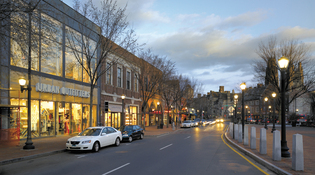 loading
loading
Exit Levin, smiling Christopher GardnerThe gentrification of the Broadway retail district adjacent to campus is just one aspect of a massive investment of Yale resources in New Haven during Levin's presidency. View full imageRenovating nearly the entire campus, building a billion dollars in laboratories, buying a new campus for ten cents on the dollar—well and good. Making peace with Yale’s unions? Now that’s amazing. Picket lines and shuttered dining halls were a rite of passage for Yale students beginning in the 1970s, as first service and maintenance workers and then clerical and technical workers became unionized and fought regularly with an administration that played hardball. This continued well into Levin’s tenure as president: there were strikes in 1996 and again in 2003. When the 2003 contract was finally settled—two years after the previous contract expired—it covered a longer-than-usual eight years, in order to give labor and management time to build a better relationship. It worked: new contracts were negotiated quietly, out of the public eye, in 2009 and again this summer. Besides his emphasis on New Haven, the other accomplishment Levin himself points to as most important and lasting is the internationalization of the university. In his inaugural address, he had made clear that Yale “must focus even more on global issues… if we are to be a world university.” That focus has been a hallmark of the second half of his tenure. “I’ve been saying now for more than a decade how important it is in this age of interconnectedness for students to develop the capacity for cross-cultural understanding,” he says. “The vastly increased numbers of students going abroad from Yale and the substantially increased numbers of foreign students coming here, the strengthening of the curriculum in international studies—all these things have made us much more of a global institution than we ever were.” During Levin’s tenure, Yale has founded a Center for the Study of Globalization (headed by former Mexican president Ernesto Zedillo ’81PhD), a World Fellows program to bring mid-career leaders from around the world to Yale for a semester, and the Jackson Institute for Global Affairs. Yale urges every undergrad to spend a term or summer abroad and offers money and support for it. And the proportion of international students in Yale College has risen from 3.4 percent in the Class of 1997 to 9.6 percent of the Class of 2016—largely because Yale now offers need-based aid for international students, just as it does for US students. Levin has also made numerous trips to China, helping to forge new research partnerships and other connections there. Most recently, Levin has staked his reputation—and the university’s—on an international venture unprecedented for Yale: a new liberal arts college in Singapore that will bear the university’s name (though it will not issue Yale degrees). For Levin, Yale-NUS College, opening in the fall of 2013 at the National University of Singapore, is a chance to raise Yale’s profile in Asia and introduce liberal education in the region. As other US universities open new campuses around the world, it is also a way for Yale to stay current. But for detractors—including a group of Yale faculty—it’s an ill-advised collaboration with an authoritarian government that does not permit the free expression required for a true liberal education. Yale-NUS has been at the center of the most vocal faculty pushback Levin’s administration has seen. Last year, a group of faculty coalesced around a number of concerns, including the administration of the Graduate School and plans to streamline support services for academic departments. This group felt a “pervasive sense of top-down policymaking,” as history of art professor David Joselit put it. The plan for Yale-NUS College, though it was developed with much input from faculty recruited for the effort, was never put to a faculty vote. Last April, a year and a half after the plan was announced, the Yale College faculty approved a resolution expressing “our concern regarding the history of lack of respect for civil and political rights in the state of Singapore.” Levin insists that Yale-NUS can thrive in Singapore. Asked whether the unaccustomed heat from the faculty had contributed to his decision to step down, he said it was not a factor. “Over the years, we’ve taken our hits on all kinds of things,” he said. “One develops a pretty thick skin about controversy.” Why did Levin choose this particular moment to leave? “I love this job and I’ve been thriving in it. It’s not that I’ve lost any steam or energy,” he said in August. “But 20 years is a long tenure, a nice round number, and I think that it’s kind of the right moment in the institution to pass the torch.” He added that a number of Yale’s plans—including two new residential colleges—still require substantial fund-raising. “We’ve done a lot to improve the financial stewardship of the university, and to make some big investments that aren’t fully paid for doesn’t seem right,” he said. “So it seemed like I might as well get out of the way now, step aside, and let someone else take on this responsibility.” Levin says he had told the Corporation three years ago that he would leave in three to five years. After the latest union contract was signed in June, Levin and his wife went hiking at Mont Blanc in France, and it was there that he decided the time was right. After he steps down in June, Levin plans to work on a book of his speeches and some new writings about higher education and the economy. He’s also looking forward to a little free time. “If you look at my calendar over the past 20 years, you won’t see much white space,” he said. But he says he’ll miss his “incredibly exciting, stimulating job. It’s been a great run. I’ve loved every minute and will continue to for the next nine months.”
The comment period has expired.
|
|